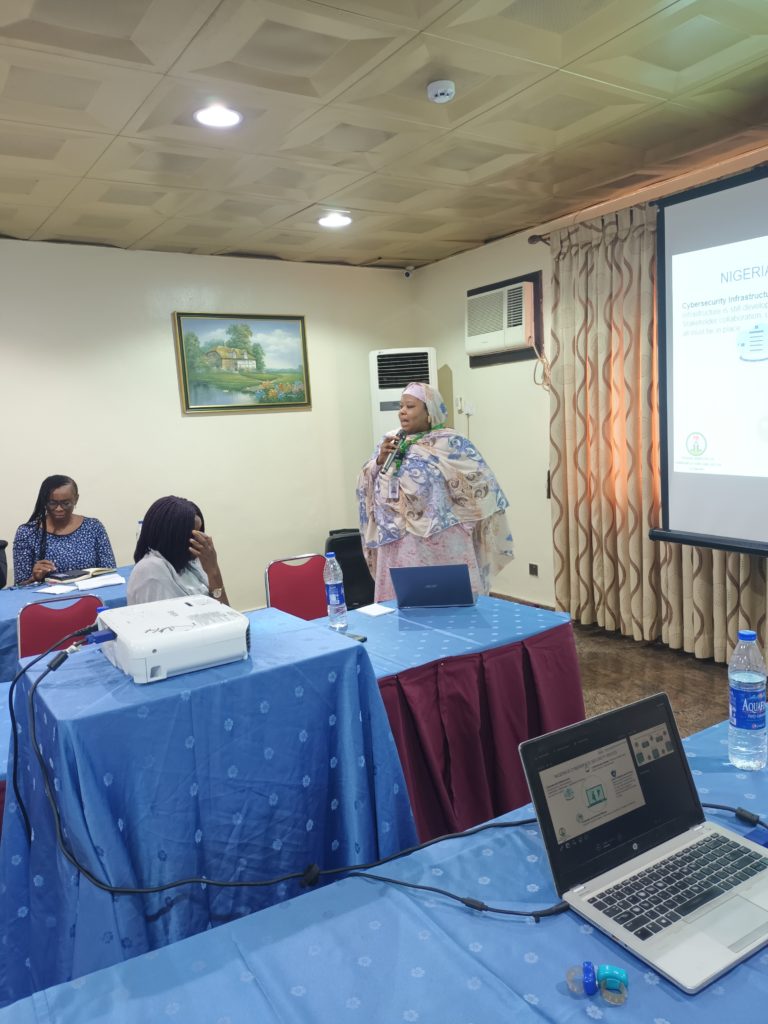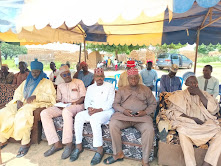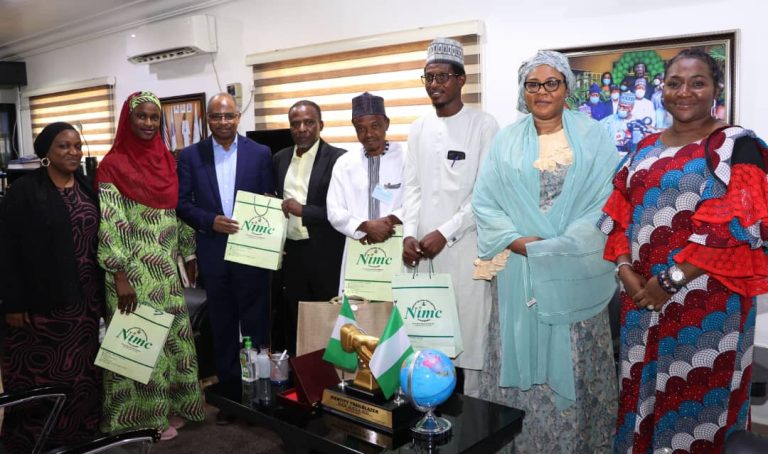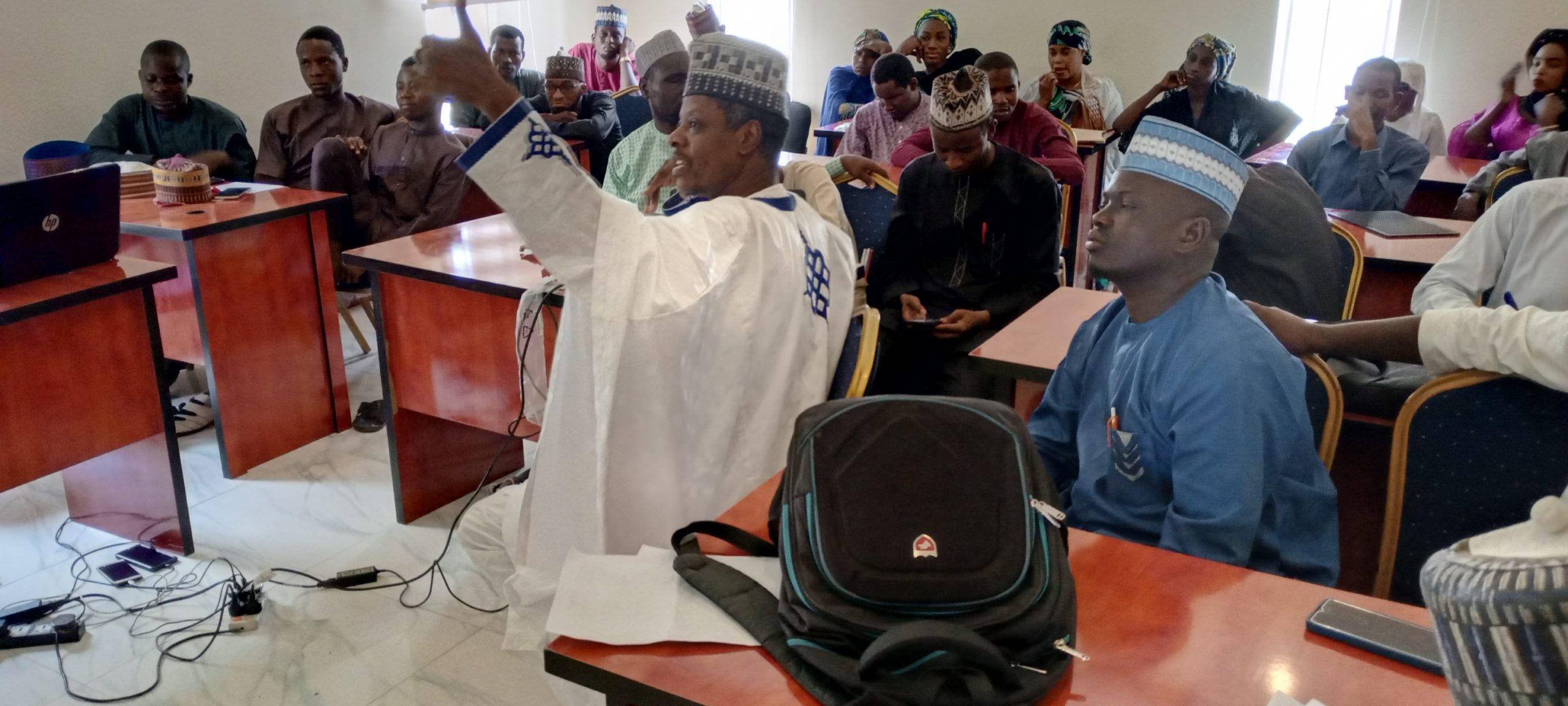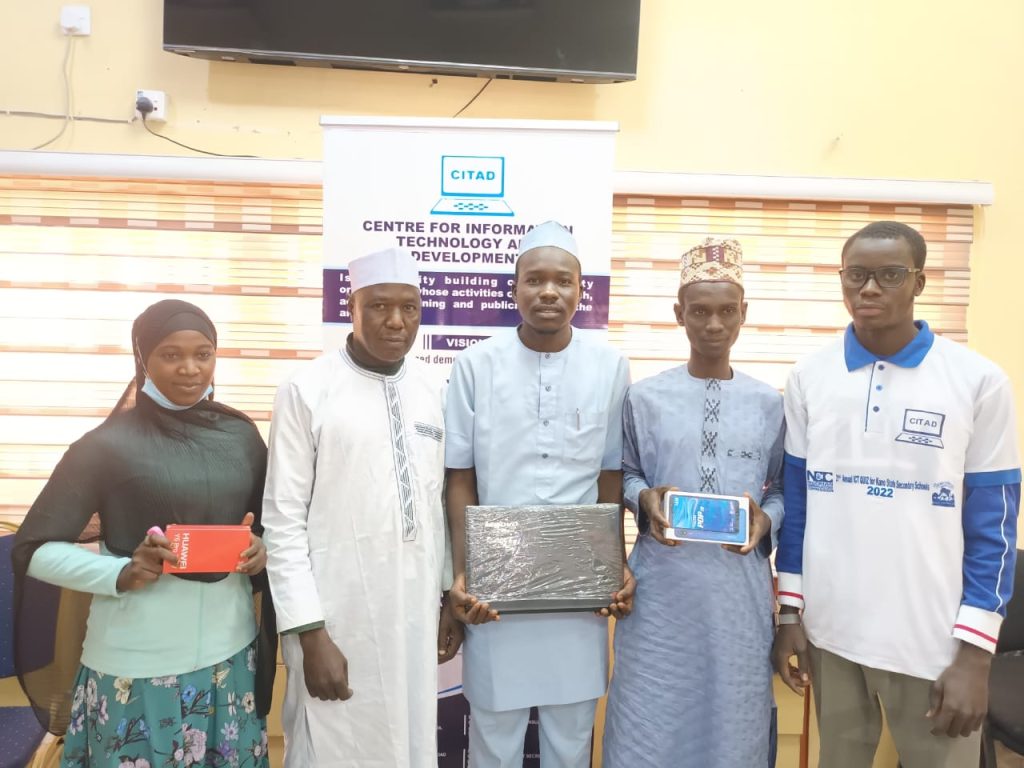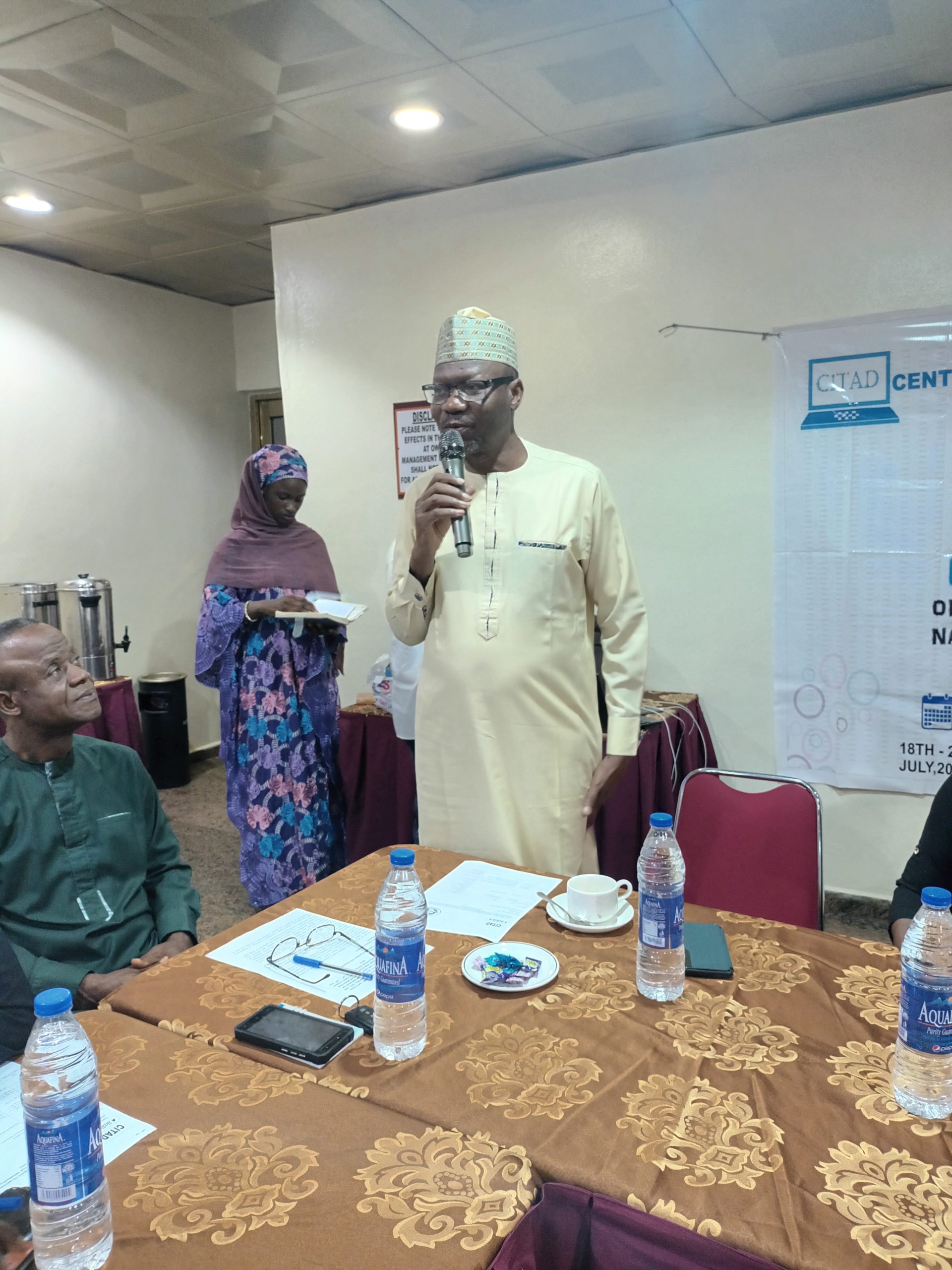
REPORT OF A 3-DAY CAPACITY BUILDING WORKSHOP ON DIGITAL RIGHTS TO NATIONAL HUMAN RIGHTS COMMISSION’S STAFF ORGANIZED BY THE CENTRE FOR INFORMATION TECHNOLOGY AND DEVELOPMENT
Date: 18-20 th July, 2023
Venue: Rockview Hotel, Abuja
The Centre for Information Technology and Development (CITAD) as part of its commitment to promote
digital rights in Nigeria and ensure the individual users of the internet rights are being safeguarded and
protected, and being that human rights online, are recognized as components of our fundamental human
rights that must be respected by all and be protected by the government from the 18 th -20 th of July, 2023
conducted a capacity enhancement workshop for key staff of the National Human Rights Commission
(NHRC) in Abuja with 18 participants in attendance. The objectives of the workshop were to:
i. Deepen the understanding of the NHRC staff of the concept of digital rights and its dimensions;
ii. Share lessons and learning from across the globe on how digital rights enforcement is
mainstreamed into the enforcement of fundamental human rights;
iii. And enhance the capacity of the commission’s staff to strategize on how they can incorporate
digital rights enforcement in the work of the Commission.
Giving his welcome remarks at the workshop, the Executive Secretary of the National Human Rights
Commission, Chief Anthony Ojukwu (SAN) started by expressing the Commission’s gratitude to
management and Staff of CITAD for identifying and desiring to expand the frontiers of discuss on digital
rights through awareness creation and capacity building for institutions with the mandate to defend
human rights in the country. Speaking on the importance of protecting Digital Rights of the citizens, the
Executive Secretary said Digital Rights are basically human rights online, and they need to be protected.
He went further to state that digital rights are aspects of fundamental human rights that must be
recognized, respected and protected by all. The National Human Rights Commission was established for
the protection, promotion and enforcement of human rights in the country, which disposes the
Commission to every aspect of activities that impact on human rights, the Executive Secretary added.
Speaking farther on the aspect of Digital rights, Mr. Ojukwu mentioned that digital rights are emerging
discourse on impact of digital technology on every aspect of human endeavor, and the tremendous
potentials for improving human lives and ability to develop.
Lamenting on how the digital rights of the citizens are being abused, the Executive Secretary said
technologies present challenges with negative impacts such as censorship, inversion of privacy, illegal
surveillance and harassment of women and children. However, he emphasized that the Commission’s is in
a position to facilitate the protection of these rights through sensitization, monitoring and enforcement.
At the end he enjoined the participants to make the best out of the opportunity graciously offered the
Commission by CITAD.
Also, giving his welcome address at the workshop, the Executive Director of CITAD, Y.Z Ya’u said the need
for the knowledge of the application of the digital rights abuses by the commission cannot be over
emphasized, as the commission is the one saddle with responsibility to defend the human rights of the
citizens in the country, and digital rights are the extension of those rights into the digital space. The
Executive Director stated that the objective of organizing the workshop is to deepen the understanding of
the NHRC staff of the concept of digital rights and its dimensions; share lessons and learning from across
the globe on how digital rights enforcement is mainstreamed into the enforcement of fundamental
human rights; and enhance the capacity of the commission’s staff to strategize on how they can
incorporate digital rights enforcement in the work of the Commission. Speaking on how the privacy of
citizens are being interfered with in the country, the Executive Director said massive surveillance being
used by the security agencies and others to monitor the activities of the citizens in the country are threat
to the existence of the democratic process in the country.
Moreover, Mr. Ya’u also mentioned that part of the aim of the program and other follow up engagements
is to show how the aspect of digital rights will be mainstreamed into the work of the commission.
Emphasizing on the importance of the digital rights, Mr. Ya’u said digital rights have now become critical
part of the citizens human rights due to the fact that almost all the activities of citizens conducted have
now migrated to digital platforms, and for this the commission need to join other actors to continue
championing the cause for ensuring the passage of the digital rights and freedoms bill in the country.
Offering a goodwill message at the workshop, the Africa Director of the MacArthur Foundation, Dr. Kole
Ahmed Shettima thanked the Centre for Information Technology and Development (CITAD) for organizing
the workshop and described it as timely. According to him, MacArthur Foundation, as an organization,
one of its key areas of concern is how to use technology for public interest, in a way that it promotes
human dignity, protect human rights, protect the most vulnerable and of course ensure that the rights of
citizens are always protected. “Our privacy, our lives, our sources of livelihood and our intellects are also
protected and hence the programme at MacArthur Foundation tagged “Technology for Public Interest”.
He added.
He further stated that it is a well-known fact that some people use technology in a way that is inimical to
rights of individuals. It is also a well-known fact that there are cases of deployment of surveillance
systems by the state governments especially in the Niger Delta without constrains and unfortunately
citizens (and CSOs) have not been really paying required attention to this unfortunate development. This
is because as we are all aware some technologies are being used to track down individuals unwillingly and
many people have lost their lives especially journalists in many parts of the world. It is also worrying to
note that these technologies are in Nigeria and many states are using them and citizens don’t know for
what purpose these surveillance gadgets are being used, he averred.
Dr. Shettima also raised concern on the ways different institutions in Nigeria collect different sort of
biometrics data of citizens which citizens don’t know what they do with it, where they are taking it to and
who they are sharing it with. The Africa Director also noted that there are many laws and regulations that
relate to either cybercrime or anti-terrorism which citizens are not paying much attention to on how
technologies are being used in those laws in order to track down people and violet their rights.
Speaking about Artificial Intelligence (AI), Dr. Shettima said in Nigeria people have not started seriously
talking and thinking about it, but the reality is that many governments (in the world) are really working
hard to make sure that their citizens are protected. This is because it has been used to stereotype people
and harm them, but unfortunately up to now we are far away from engaging in such conversation let
alone of having a regulatory framework on how to use such technologies (AI) to make our lives more
advance and better.
At end, he expressed happiness that the conversation is happening with the NHRC.
On her part, the Executive Director of Association for Progressive Communications (APC) who was
represented by Peace Oliver, the African Regional Coordination of the organization, while giving her
welcome remarks at the training said she was very happy that this training was taking place at this time
when the issue of digital rights abuse of the citizens was increasing everyday and most of the time the
perpetrators are going freely leaving the victims at the mercy of their own self. She added that what she
is particularly happy about the training was the fact that the beneficiary of the training were those who
are responsible of protecting the rights of the citizens in the country. Speaking about how they take the
issue of digital rights, the ED said at APC, digital rights is one of areas the organization holds dear in its
work, and it is what they are advocating for over years.
Speaking on the importance and need for the digital rights, the Executive Director stated that respecting
and protecting the digital rights of the citizens was now a must and responsibility of everyone involve in
this works as the lives of the citizens is migrating to online platforms faster than we imagined. She went
further to said that almost all the activities citizens conducted especially journalists, activists and human
rights defenders are now migrated to internet, hence, the need to ensure the platforms are safe, secure
and friendly to use by all.
TRAINING:
Day One:
On the first day of the training, the participants were taken through the Foundational Basis for Digital
Rights by YZ Ya’u, Executive Director of the Centre for Information Technology and Development. Mr. Ya’u
started his presentation by taking the participants through the Changing Nature of Society and how the
internet has change the way we live. He also discussed The Industrial Trajectory, where he discussed 1 st
Industrial, 2 nd Industrial and 3 rd Industrial revolutions. Key Drivers of Earlier Industrial Revolution were also
discussed by Mr. Ya’u. Another topics touched by Mr. Ya’u while discussing the Foundational Basis for
Digital Rights were: Enters the Information Society; The Origins of the Discourse on Digital Rights; What
are Digital Rights; Why Digital Rights Matters; State of Digital Rights in Nigeria; Who are the People
Excluded including Availability of infrastructure, Affordability of digital goods and services, Capacity to use
digital devices. He also went further to discussed Estimating the Digital Excluded in the Country; Major
Challenges to Digital Rights; Some examples of How Digital Rights are abused or derogated in the country
and Status of Digital Rights in Nigeria
After the first presentation by Mr. Ya’u, participants were asked to identify the current Technology Use in
the Work of the Commission. Technology tools such as: Call Center, Internet-Based Complaint Platform,
ICT Unit, E-Library, and Platform for Lodging Complain were mentioned by the staff of the commission
present at the training.
Participants also agreed that the workshop was only the beginning of the engagement with digital rights.
While discussing current uses of technology in the work of the Commission, participants resolved as
followes:
- That there is need for more training, especially for staff of the organization at zonal offices
- There is need to improve on access to technology across the offices of the Commission
- That the online human rights abuse platform of the commission should incorpate use of local
languages in addition to English - A meeting of all relevant agencies as well as private providers should be convened to discusss
the issues of digital rights and identify the individual and collective role the stakeholders should
play in promoting digital rights in the country/
The second presentation of the day was on Planning for the Monitoring of Digital Rights Compliance in
Nigeria by Angela Uzoma-Iwuchukhu, Country Director, Lawyers Without Borders, Nigeria. Mrs. Uzoma
started by defining what digital rights is all about. Then she discussed about Digital Rights in Nigeria –
Current Reality. Other issues she covered include: Monitoring Digital Rights such as: Freedom of
Expression; Digital Rights Education; Access to Information & Services; Rights to Privacy; Legal
Framework. And lastly she touched the Monitoring Index like Patterns, Key Actors, and Legislations in the
country
The last presentation of the day was on Legal Perspectives on Digital Rights by Barrister Hussain Hussain
of the Eastward Legal Services. Barrister Hussain started by discussing on the Fundamental Rights of the
Citizens. Other issues discussed by Barrister Hussain were: Case Study of Political View on Provision of
Access to the Internet for all; Internet Regularability and Digital Rights; Cyber libertarians; Cyber
paternalists; Network Communitarianism; What School of Thought is Prevalent in Nigeria; How can Digital
Rights be Safeguarded. Incorporated Trustees of Digital Rights Lawyers Initiative & Ors v. NIMC (2021)
LPELR-55623(CA). Limitation to Digital Rights in Nigeria and how to Break the Barrier and Avoid Liability.
Day Two:
On the second day of the training, a recap of what had been discussed on the first day was done, during
which the participants were asked to mention one or two things they learnt in the previous day. After the
recap, Barrister Emmanuel Edet, Director, Legal Services, National Information Technology Development
Agency (NITDA) took the participants through the Protecting Children Online and the Current Policy in the
Country. Mr. Edet started by exploring the origin and need for children to have specific rights; the rights
of a child; Enforcement Measures. He also highlighted the steps taken by relevant stakeholders to enforce
the rights of a child in the country. After that he discussed on Parental Advisory to ensuring the rights of
children are being safeguarded, and continued to highlight what can be done to improve child protection
in digital environment. Other issues discussed by Mr. Edet were: Child Rights as Subset of Human
Rights with particular attention to the rights of special protection and care afforded to minors; History of
Child Rights; Global Outlook on the Rights of a Child; Convention on the Rights of the Child; The African
Charter on the Rights and Welfare of the Child Rights Act. Moreover, Mr. Edet also touched on the
responsibilities of different stakeholders on the child rights; Mechanisms for Compliance; Parental
Advisory; Child Online Safety Index (COSI). At the end of his presentation he gave some recommendations
on how to ensure every child’s rights is being protect. Some of the recommendations he offered were:
Strengthening of Legal Frameworks and Institutions, Creating sustainable programmes with measurable
objectives, and collaboration i.e. engaging everyone in the process.
The second presentation of the day was on African Declaration on Internet Rights and Freedoms by YZ
Ya’u. On this presentation, Mr. Ya’u focused on the 13 principles of the African Declaration on Internet
Rights and Freedoms such as: Openness, Internet Access and Affordability, Freedom of Expression, Right
to Information, Freedom of Assembly and Association and the Internet, Cultural and Linguistic Diversity,
Right to Development and Access to Knowledge, Privacy and Personal Data Protection, Security, Stability
and Resilience of the Internet, Marginalised Groups and Groups at Risk, Right to Due Process, Democratic
Multistakeholder Internet Governance and Gender Equality. On this presentation, Mr. Ya’u explained to
the participants the importance of each of the principle, how it could be achieved and the contribution
National Human Rights Commission can play to ensure the realization and respect of each of the
principle.
The third presentation was on Gender Violence Online as Digital Rights Abuse by Barrister Mojirayo
Ogunlana-Nkanga, Executive Director and Founder of Digicivic Initiative. Mrs. Ogunlana-Nkanga dwelled her
presentation on Online Gender Based Violence (OGBV), violence against women and how technology is being
used to abused individuals on the basis of either their religion, gender or race. The legal expert also discussed on
the True Nature of Online Violence in the Digital Age and how it is impacted of the lives of the OGBV victims.
Some of the impact according to her are; self-censorship, mental health, reputational damage and insecurity
After Mrs. Ogunlana-Nkanga presentation, it was followed by the Professor Nsongurua J. Udombana, LLD,
FCArb presentation on Enforcing Digital Rights in Nigeria: Opportunities and Challenges. Professor
Nsongurua focused his presentation on how the commission can use the existing laws in the country to
enforce the compliance of the digital rights in the country. He also discussed on the opportunities that
exist in the country which the commission can capitalize on to defend the victims of the digital rights.
However, the University don pointed out some of the challenges that can hinder the enforcement of the
digital rights in the country. The challenges according him are lack of substantive laws in the country,
overzealous of the security agencies, abuse of the court orders and lack of proper awareness among the
citizens.
The last presentation on the second was on the Draft Digital Rights Bill in Nigeria by Boye Adeboye, Senior
Manager, Paradigm Initiative Nigeria (PIN). Mr. Adegoke took the participants through the history of the
draft Digital Rights and Freedom Bill in Nigeria; how it was started, the actors involved, and how it was
rejected by the president in 2018.
Day Three:
On the day three of the training which was the last day of the training, participants were taken through
Digital Rights and Civic Space by Patrick Allam, Legal Officer, Spaces for Change. Mr. Allan started by taking
the participants through the Nigeria’s Digital Landscape; the State of Civic Space in West Africa; The State of Civic
Space in Nigeria; General Limitation of Civil Space; Regulation of Digital Spaces in Nigeria; Key Findings of the
Report on Civic Space Violation, and Modes of Online Attacks. He also discussed Roadmap for Change to Civic
Space violation such as: Regulation, Legislation and Sanction, Import and Export Controls, Increased
commitment to sensitization, capacity building and awareness-creation, lead reforms for accountability
and access, and Pushing for legislative and judicial reviews of repressive laws.
The second presentation on the third was on Digital Identify as a Right: A Look at the State of the NIMC
Registration by Jamila Ahmad, Assistant Director, Office of the Director General, National Identity
Management Commission (NIMC). Mrs. Ahmad focused her presentation on how NIMC is ensuring every
citizen has a digital identity which the commission consider as a right to every citizen. Some of the specific
topics she discussed were: Digital Identity as a Human Right; The Digital Identity?; The Importance of
Digital Identity; Nigeria’s Socio-economic Challenges; Nigeria’s Cyberspace Security Issues; The Role of
NIMC in Bridging Socio-economic and Security Challenges; Digital Identity Vs. Data Protection; Navigating
the Digital Landscape
Moreover, the final presentation at the training was on Data and Privacy Protection in the Context of the
National Data Protection Regulations. This particular presentation was conducted by Hauwa Ibrahim
Hadejia, Legal Enforcement and Regulation Officer at the commission. Miss. Ibrahim dwelled on the roles
and responsibilities of the NPDC in protecting the digital data of the citizens and the newly signed
Nigerian Data Protection Act. Some of the specific areas the presentation paid attention to were:
Individual’s Privacy Online?; Privacy Issues in the Digital Age; Protecting One selves from Privacy Issues;
The Roles of Companies and Governments in Data Protection? Foundations to Data Protection, Risk and
Challenges in Privacy Protection; Nigeria Data Protection Act (NDPA) 2023; The Role of the Nigeria Data
Protection Commission (NDPC), and Expectations of the NDPC.
To conclude the event, the participants discussed on how to promote the passage of the Digital Rights
and Freedom Bill in the country. Some of the points raised were:
i. Advocacy to the concerned agencies like NITDA, NPDC, NCC
ii. Advocacy to the National Assembly’s relevant committees i.e. House Committee on Human Rights
for their buy-in.
iii. Advocacy to Ministry of Justice
iv. Awareness creation among the citizens especially social influencers to help in pushing for the
passage of the bill
v. Engagement with social influencers to help in amplifying the message
vi. Robust engagements with media house
Observations:
That national security has always been the basis for the violation of citizens’ digital rights
That technology giants are the ones governing and censoring the digital space not the
government
That children are one of the categories of individuals that are vulnerable online
Recommendations:
There is a need for more sensitization on data protection on digital rights in Nigeria
Complaints channeling platforms should be provided with the automated language
translation package
There is a need for more training for staff of National Human Rights Commission on the
newly emerging digital rights
There should be a fora that will bring together critical stakeholders on board to discuss
and come up with a well formulated and well-thought-out policy frame that can be
translated into law or at least policy direction framework
The staff of the commission should be trained on how to handle online complaint
platform effectively
NHRC should collaborate with relevant sister agencies such as NDPC in the area of
training and signing of MoU that will facilitate the protection of digital rights of
Nigerians
There is a need for more concerted effort on the part of the relevant stakeholders in the
area of legislative buy-in and lobbying
